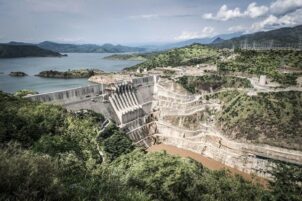
New research unpacks the sustainability disclosures of the Italian construction company WeBuild (formerly Salini Impregilo)
Picture | The Gibe III dam, Ethiopia. Credits: © Fausto Podavini, ‘Omo Change’ project
‘We build value’. This was the motto of the former Italian construction company Salini Impregilo, rebranded WeBuild in early 2020. What kind of value they built is under question in our latest scientific paper, recently published in the Journal of Business Ethics.
On December 17, 2016, Ethiopia inaugurated the Gibe III dam, under the aegis of the country’s prime minister, Salini Impregilo’s chief executive and the Ethiopian Electric Power chief executive, among other investors. According to the project promoters, the dam would boost Ethiopian economy and bring prosperity to the country. Sources reporting the effects of Gibe III on the local population, however, tell a different story
The dam was built in a climate of political tension and a state-driven strategy of criminalisation and violent confrontation with the indigenous peoples of the Omo valley, as sources such as the Oakland Institute, Survival International, or Re:Common reported. Attacks and murders of community members, forced land acquisition, displacement, loss of livelihoods and a long series of environmental and hydrological impacts added to the worrisome situation of the Ethiopian valley and the downstream Lake Turkana in Kenya. While Salini Impregilo was proud to declare that the intervention ‘offered benefits for local communities’, facts show how large-scale infrastructures are often pushed forward by means of force and violence, and with controversial outcomes. At the same time, Salini Impregilo made a fortune, all while issuing sustainability reports and complying with Corporate Social Responsibility (CSR) mechanisms, such as the UN Global Compact and the Global Reporting standards. CSR mechanisms such as these have proliferated over the past years. They are supposed to regulate company activities for societal good, but their self-reporting nature means that they often fall short, or worse, are used as a way to conceal unethical behaviours.
WeBuild’s history is more than one century long, the result of the merger of several construction companies. It specialises in infrastructure development and is well known in the water infrastructure segment. Over the past century, they have built more than 300 dams for a total capacity of about 53’000 MW, mainly in the Global South. In addition to the Gibe III and the Grand Renaissance dams in Ethiopia, the company has built many large dams in highly contested territories and under very violent circumstances: for example, El Quimbo in Colombia, the Mosul dam in Iraq, the Chixoy dam in Guatemala, the Highland Water Project in Lesotho and the Tokwe Mukorsi dam in Zimbabwe, to name a few.
From a political ecology perspective, we took WeBuild as our case study to question the validity of CSR mechanisms, by scrutinising 38 highly controversial hydropower development projects tied to the company throughout the last century. These cases were selected from a much larger portfolio of projects that the company has built over time and represent the ones with greater concerns and with a sufficiently large amount of recorded evidence of impacts. We collected unsustainability claims from a wide range of sources: NGOs, environmental justice organisations, journalists and media, scholars, grey literature, social movements and local or indigenous communities. These unsustainability claims range from construction design defects to forced displacement and loss of livelihoods of local communities. With these results, we argue that modern CSR frameworks fail in including critical information that may crucially determine the (un-)sustainability and ethics of corporate behaviour – most importantly, information generated with and by affected communities. The research was inspired by the work of the EnvJustice research group in building the EJAtlas, the largest inventory of socio-environmental conflicts globally.
The publication of the paper triggered a back and forth between WeBuild and us through the Business and Human Rights Resource Centre (BHRRC) website. BHRRC works to strengthen corporate accountability and transparency, and made our publication known to WeBuild directly. The company did not hesitate in raising a list of perplexities. After we chose to address their concerns publicly, we were told by the BHRRC team that the corporation refused to reply further.
WeBuild are only a part of the large and complex web of power and materials that drive so-called development in the Global South and growth in the North. To truly regulate the behaviour of such massive corporations, the voices of those affected by extraction and infrastructure need to be central in determining the sustainability of company behaviours. Until weak and voluntary CSR mechanisms are in place, CSR will continue to be an essentially empty practice, allowing companies to celebrate cherry-picked achievements while hiding any trace of injustice.
Authors | Antonio Bontempi, Daniela Del Bene and Louisa Jane Di Felice are researchers working on political ecology, ecological economics, complexity and environmental justice. They are based at the Geography Department of the Autonomous University of Barcelona (UAB), at the Institute of Environmental Science and Technology of UAB and the IT University of Copenhagen, respectively.

The project ENVJUSTICE has received funding from the European Research Council (ERC) under the European Union’s Horizon 2020 research and innovation programme (grant agreement No. 695446)